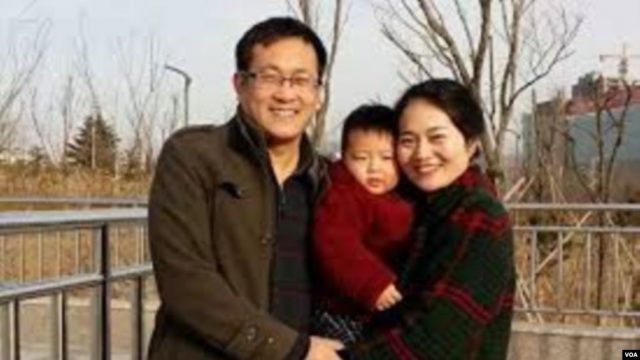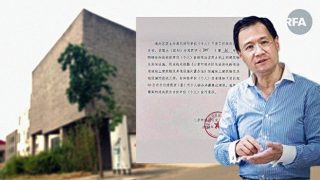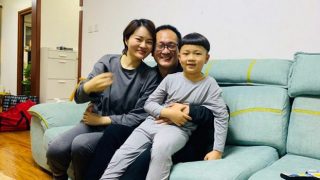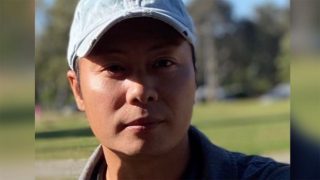
One day after his release from prison, Chinese rights lawyer Wang Quanzhang told friends that he is being watched by state agents — fueling calls at home and abroad for China to stop using the pandemic as an excuse to extend his incarceration.
The European Union said, in a press statement, that it expects Wang’s release to be “unconditional, with particular regard to his freedom of movement and to establish residence, including the possibility to reunite with his family in Beijing” — a stance endorsed by many international rights groups.
“His rights under China’s legislation and international commitments were not respected during trial and detention. Reports about Mr. Wang being subject to serious mistreatment and torture must be thoroughly investigated,” the EU statement added.
An illusion
Amnesty International (AI) China researcher Doriane Lau called Wang’s freedom an “illusion” until the Chinese government lifts all restrictions.
After Wang completed his four-and-a-half-year detention, “the politically motivated campaign against him is only likely to enter a new phase. Despite his release, he will be subject to heavy surveillance and unable to return to [Beijing],” Lau warned in a statement.
“They are taking advantage of the COVID virus situation and using that as a very convenient excuse to basically detain him further or control him further,” another AI analyst William Nee told VOA.
Nee said that Wang’s case is emblematic of China’s flawed rule of law as it has been riddled with inconsistencies and illegalities even according to China’s own criminal procedures.
“The Chinese authorities should stop any form of harassment,” the China Human Rights Lawyers Concern Group said in an earlier joint statement signed by ten other organizations to call for the international society’s attention on Wang’s condition.
Set him free
“Beijing’s insistence on prosecuting Wang… reinforces a dangerous mindset: that stability trumps free speech, and a ‘harmonious society’, human rights,” Sarah Brooks, Asia Advocate at International Service for Human Rights, also said in the statement.
Wang, a lawyer who had defended political activists, victims of land seizures and members of the banned Falun Gong spiritual movement, is being placed under a 14-day quarantine in his hometown Jinan, China’s eastern Shandong province 400 km south of Beijing, where his family of three live.
During a phone conversation, Wang told peer lawyer Li Heping that state agents in the corridor outside his apartment in Jinan are keeping an eye on him and, before his release, he’d been tested five times for coronavirus, Li’s wife Wang Qiaoling tweeted early Monday.
Unreasonable quarantine
That prompted Li’s wife to say that lawyer Wang “should immediately go home [to his family in Beijing]. No need to wait for another 14 days. The 14-day [quarantine] is unreasonable.”
In earlier tweets, she complained that police in Jinan were keeping lawyer Wang away from everyone including delivery boys and his closest kin.
His cousin and those who tried to deliver food and flowers to his apartment were once taken into the police station for questioning, she tweeted.
Li Wenzu, wife to lawyer Wang, reiterated the family’s wishes to be reunited in Beijing.
“It’s an illegal act for the government to limit individual personal freedom. This is against our free will. What I and Quanzhang want is to be reunited. We want a family reunion in Beijing,” she told VOA.
She said their son, who turns seven, keeps asking why his father hasn’t returned on Sunday.
Calling Chinese officials “liars” and “hooligans,” Li said she is worried that Wang will be permanently put under house arrest in Jinan even if the 14-day quarantine comes to an end.
On Twitter, support for Wang’s genuine freedom has been growing.
Growing support online
One user wrote “Wang’s fate in 14 days will be decided by how [strongly] the international society reacts… China may adjust [its control of him] if it is under heavy pressure. If not, it will continue its evil act.”
Shao Jiang, a former Tiananmen movement student protester, who now lives in London, tweeted that Wang “must be granted freedom, not ‘non-release release’.”
Non-release release is a term coined by leading New York University School of Law China expert Jerome Cohen to describe China’s practice of putting rights activists under de facto house arrest upon their release from detention.
According to Safeguard Defenders, China’s practice of ‘non-release release’ may last up to a year or more commonly for a few months.
“It is an exercise in controlling news, diplomatic and general media attention in high profile cases, and especially to block reports on victim testimonies of torture or other illegal behavior,” the rights group said in a press statement last week.
A Chinese lawyer who befriends Wang told VOA anonymously that he remains worried about Wang’s mental and physical condition after years of incarceration.
He added he’s pessimistic that China will cave into international pressure or ease its control of Wang.
The rise of China has empowered itself to build up its own narrative, growing more and more reluctant to take criticism from other governments, despite that “what China has done [to Wang] is illegal and against human nature,” he said.
On Weibo, China’s Twitter-like social microblogging platform, no mention of Wang’s release can be found as state censorship is common.
Source: Voice of America



